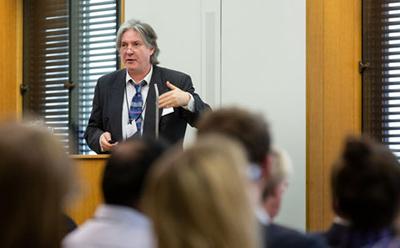WSI Director Speaks to Parliamentarians at Portcullis House

On 27th February, WSI Director with responsibility for policy, Kieron O’Hara, gave a keynote at the annual Parliament and Internet Conference, at Portcullis House, Westminster.
Organised by ISPA-UK, the Internet Service Providers’ Association, the theme of the conference, which attracted Parliamentarians and representatives of the of the Internet Service Providers industry, was ‘the Digital Policy Agenda for Global Britain’, clearly chosen for its post-Brexit relevance.
Kieron’s talk, following the opening keynote by Matt Warman, Minister for Digital Infrastructure, was on ‘Four Internets’, the theme of his recent research with Dame Wendy Hall, which has recently been reported in Wired, and the Communications of the ACM. He outlined four archetypes of how the internet is being governed and structured across the globe.
The Internet’s original architects envisioned an open Internet that favoured interoperability and persistent innovation with low levels of regulation. While there is still strong support for this model, particularly in Silicon Valley, a number of alternatives have emerged to counter real and perceived problems with this model of openness. The “Bourgeois” response is led by the European Union and seeks to balance demands for individual freedom with the need to protect society from harm. As a result, it favours stronger regulation around issues such as data protection. The “Paternal” response, is particularly developed in China and above all seeks to support and protection social cohesion which in turn can lead to restrictions of liberty and privacy. The “Economic” response is another US approach with a focus on the protection of economic rights and contracts, thus favouring winner-takes-all or walled garden approaches at the cost of interoperability.
With global internet penetration at below 50% and countries like Russia starting to developing their own approaches to the internet, Kieron closed his keynote by pondering what model will prevail onthe African continent or in countries such as India with the latter seeming to follow the Chinese approach while tending to entrench nationalism.
The keynote was well-received, with many questions and much discussion in the lunch interval that followed, particularly on the topic of where the UK stands in this scheme.
Links to external websites
The University cannot accept responsibility for external websites.